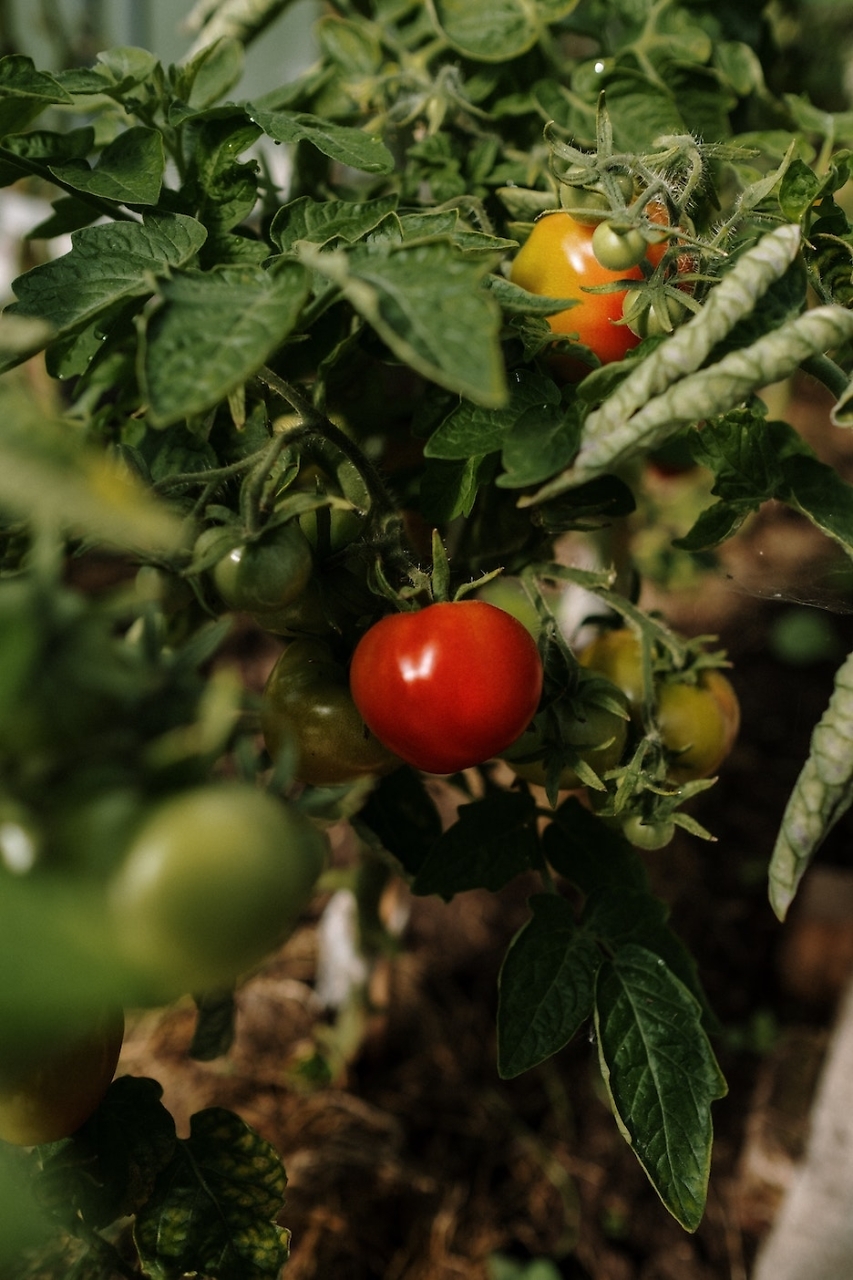Holy Ground
Writers across the state—and the nation—are grieving the loss of Rivendell Writers’ Colony
Rivendell Writers’ Colony, established in 2013, is closing its doors at the end of March. It is closing not because of any failure but because its benefactor—who owns the property and who has helped to sustain it with her own funds—has decided to devote the property to a new purpose.
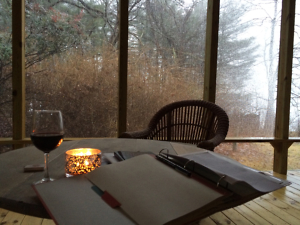
I’m still in shock at the news because Rivendell was flourishing, on course to be a nationally known residency program, and because the actual, physical space, the land I know as Rivendell, will continue to be just what it is, not closed at all.
Let me give you a snapshot: wooded acres on the Cumberland Plateau in Sewanee, Tennessee; a stunning bluff view of Lost Cove, land known to be sacred to Native Americans; two ponds ringed by trees; a manor house and several smaller dwellings that have been a haven to me and many other writers over the past five years. All of this will stay, but the gate will be shut to the writers whose stories and poems and essays have found shape here, and to so many more who had yet to sign the guest book. As the news hit social media, I saw many wistful and regretful comments: I wish I had gone. I was planning to go.
Just five years—but in some ways it feels much longer.
It can take a long time for a new arts organization to find its footing and reach true sustainability. The journey is typically slow and unsteady, encumbered by impossibly tight budgets, subject to the prevailing economic winds, made or broken by the energies and commitment of its staff and board and supporters. But this writers’ colony was thriving—truly loved by those who ran it, blessed with a second-to-none physical location, and growing fast—all proof of its success. That its journey is being cut short now feels like nothing less than a tragedy, at least to the writers who have loved it.
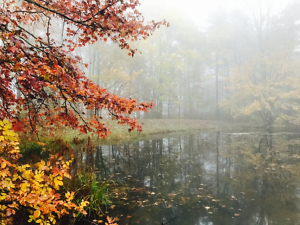
The Southern Foodways Alliance held an annual retreat here, as did Parnassus Books. Writers as diverse as Leigh Ann Couch, Kiese Laymon, and Jeff Zentner have led special weekend workshops. Rivendell seemed to be on course to join the ranks of esteemed residencies like MacDowell, Yaddo, Hambidge, Ragdale, Vermont Studio Center, Hedgebrook, and many others. And it was one of just a thimble-full of residency programs in the Southeast reserved exclusively for writers.
I first came to Rivendell in the spring of 2014 to lead a retreat offered by The Porch, the literary-arts organization I co-founded and co-direct. The Porch was still a young program itself when we welcomed our first guests to Rivendell. Our theme for the weekend was “Sense of Place,” and I instantly understood I’d come upon an ideal setting for such an inquiry.
I have photographs from that visit and every visit since: another seven Porch retreats, a solid handful solo, and on one occasion a weekend in the company of writer friends. I thought I’d be there with them again before too long.
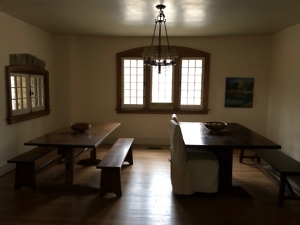
Now, with the cold understanding that I’ll never again occupy that space, I’m reeling, bereft—I feel like I’ve lost a friend, and with no warning at all. But I’m thankful for what Rivendell has been, and for the chance to take those photos. It’s hard to take a bad picture there, so mine do a fine job of telling at least part of the story. In all four seasons I have walked the wooded paths of Rivendell, gazed out onto the broad slopes of Lost Cove. I’ve dreamed crazy dreams in those deliciously comfortable beds, hidden from the world in those amazing bathtubs, watched the wind toss the branches from the windows of the Manor, laughed with fellow writers in front of the hearth, watched deer lap at the pond’s edge from the screen porch.
And written my heart out.
With every moment, I’ve imagined so many more seasons of my life layered onto Rivendell’s, imagined the opportunity to witness both the constancy of a weather cycle displayed on this unique tableau and the incremental change of the natural world over time. I was always aware that being there was great good fortune. What a supreme gift, to be able to go to this place, and for it to be so close to my home! But I believed too surely in its permanence.
Focus your gaze on a huddle of acorns, a few gently anchored to the earth by little green tendrils in the “dead” of winter. Observe the way late-afternoon light splinters, like the points of some giant star, through a stand of trees. Or stand very still in the famous Sewanee fog, marveling at the bare branches swimming in it. I loved the fog the very most.
A place so still but so alive. Listen: calls, cries, songs, rustling, snuffling. A plop in the pond.
Linger on cloud reflections in the ponds, or a moss-laden path, or, always, the changing light and sky and seasonal colors of Lost Cove, with its two diagonals so neat and enormous and beautifully bewildering in that way of great vistas. It’s right there, so close; it’s forever away, a place I’ll never go.
Beyond the natural world, what these images reveal to me is a mind calmed but not at rest. A mind, a vision, with the incessant clutter of “real” life tumbled away down the mountain as my car climbed the steep limestone cuts of I-24. There was a palpable release in that approach.
I should have known all along that it could not last forever.
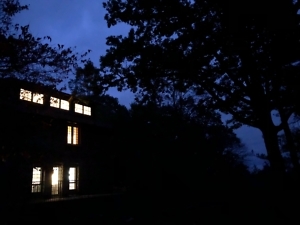
But naively, or with a fatal whiff of entitlement, I did believe Rivendell would be a part of my writing life to count on for years to come. I was far from alone in that feeling. Kory Wells, Poet Laureate of Murfreesboro, expresses emotions that mirror mine:
It sounds dramatic, but this change of direction feels so much like a sudden death. And like someone who loses a loved one too soon, I feel cheated. I planned on Rivendell being a part of my life for the rest of my life. Of course to everything there is a season, and there are no guarantees, and things change, and insert your favorite platitude here, but Rivendell appeared to be still-new and growing. Healthy and thriving. How could it possibly be time for such a radical change? How could there be no signs of demise to prepare us for this shock?
Writers came and then wanted nothing more than to come back as soon as possible, to be once more in that magic space on the mountain.
Yes, magic: Rivendell has been described just this way by many, as director Carmen Toussaint noted in the farewell letter she sent to all the writers who have worked there. We have not chosen this word lightly. When we say it to each other, we know just how spookily true it is. But I found all the evidence I needed in the days and nights I spent there, in the persistent flare and glow of my thoughts.
After March, according to its owner, the Rivendell campus will be used as a spiritual-healing retreat.
But Rivendell was already a spiritual retreat for the writers and readers who came there. If one objection has echoed in the week since the announcement, this is it. We came there seeking. We came to testify in the only way we knew how. We came in a kind of prayer, in belief against odds, in reverence, in search of redemption through words, lines, narrative. It’s no exaggeration to say that some of us were saved.
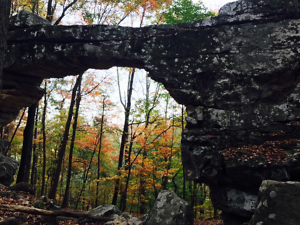
And as with magic, I am not one to use the word blessing lightly. Rivendell has been a blessing to so many. I’m especially thankful for the presence and hard work of its generous director, Carmen Toussaint, who gave it her all. I’m thankful for her friendship.
Thinking of this loose group as a tribe of which I’ve been a part—those of us fortunate enough to write in this space, to share time there together—gives me some solace. A few days into receiving the news, I’m trying to turn my sense of loss toward gratefulness. Just think: what if I’d never known this place?
I’m trying, but I’m also grieving. With these words I’m taking up Rivendell space in the only way I now can, while I can. How is it possible I’ll never stand on that ground again? These are the words of a woman who, too often, struggles to feel at home in the world. Who found, in Rivendell, a space where she felt fully herself, her mind doing nothing but exactly what it was built to do, her attentions focused only on what nourished them most.
When I would return from Rivendell, well-meaning folks would say I looked so relaxed. Had I had a good time? Of course it was a good time, and I won’t say it wasn’t at all relaxing, but what I did there was work. It often felt challenging to articulate to friends the role of Rivendell in my life, but the impossibility of explaining a writing life is nothing new. I’d take that tiny burden a million times over if I could—if I could keep returning to Rivendell to work, to think, to be.
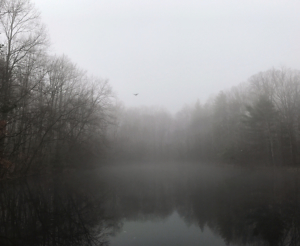
Our world is less and less accommodating to this kind of work, and we need havens for creativity more than ever. But I’m less naïve than I was a week ago, and I don’t know what the future holds for these places of great sustenance and energy and productivity. It’s hard not to feel that they are islands, eroding.
During my last stay at Rivendell, my husband and nine-year-old daughter came to visit for a day. It was Thalia’s first time to see Rivendell after hearing me talk about it for years. She ran through the Pondview House and darted down to the water’s edge: “This place is so cool; could we just come here for spring break?” We walked through the woods and the field, past the garden and the manor house, and over to Carmen Toussaint’s house, where we visited her chickens and horses and her barn cat, Percy. We walked to Natural Bridge and talked about how we weren’t afraid to cross it—no, not us, never us. We felt no fear. The sun set, and my family left for home, and I stayed, happy to have shared this with them, happy to be just me and my words for a few more days, more myself than ever.
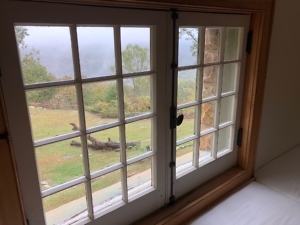
I’m glad I can write that memory down now. I’m glad I can read the words of others. On Facebook the other day, Wells posted a memory, preserved in her journal, of a time she spent at Rivendell:
After midnight I awoke hot, and had to open the window. All I could hear was silence, then once, something wild howled—only once. And now the day has been beautiful and warm, and I have tramped through the woods to the pond, singing. I scared a doe who bounded away a few steps, only to turn and look at me. And now I sit on a concrete bench overlooking Lost Cove, and the sun is falling lower in the sky, and I think how lucky I am.
We can go forth with the belief, the consolation, that the grace of Rivendell will continue to show up in the writing of those who knew its magic, and in the acknowledgements tucked into the final pages of so many books yet to be published. I harbor hope that my own is among them. It is a gift I must return to a place that has nourished my work—my spirit—like no other.

Susannah Felts is a writer, editor, and educator in Nashville, as well as co-founder of The Porch Writers’ Collective, a nonprofit literary center. She is the author of This Will Go Down On Your Permanent Record, a novel, and numerous journal and magazine articles.
